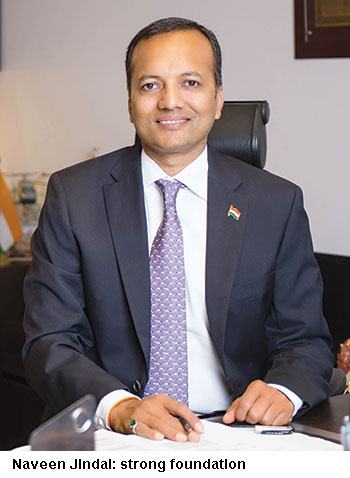Young Achiever: Naveen Jindal
 Delhi-based Naveen Jindal is the antithesis of the dyed-in-the-wool industrialist, despite being an executive director of the ten-strong Jindal Group of companies (aggregate annual sales: Rs.5,500 crore) with interests spanning sponge iron, steel and power. When he isnt attending to his duties as the executive vice chairman and managing director of Jindal Steel & Power Ltd (JSPL), this business management alumnus of Texas University is a national polo player and international level rifle marksman.
Delhi-based Naveen Jindal is the antithesis of the dyed-in-the-wool industrialist, despite being an executive director of the ten-strong Jindal Group of companies (aggregate annual sales: Rs.5,500 crore) with interests spanning sponge iron, steel and power. When he isnt attending to his duties as the executive vice chairman and managing director of Jindal Steel & Power Ltd (JSPL), this business management alumnus of Texas University is a national polo player and international level rifle marksman.
After Jindal took charge of JSPL in 1995, the company has recorded spectacular top and bottomline growth, making it one of the most profitable medium scale corporates globally. But the achievement that Jindal, youngest of the four children of steel industry visionary O.P. Jindal prizes above all, is his epic battle in the courts culminating in the Supreme Court affirming the right of all Indian citizens to fly the national flag.
“When I got back from the US in 1991, I was shocked to learn that lay citizens weren’t allowed to fly the tricolour. So I decided to do something about it,” he recalls.
After a protracted, seven-year-long battle which began with a writ petition filed in the Delhi high court, the Supreme Court upheld the right of all citizens to display the tricolour as advocated by Jindal. “It’s natural for all Indians to have this important right to ownership of their greatest national symbol, the tricolour, and live by its ideals,” he says. Not surprisingly, Jindal is also the president of the Flag Foundation of India.
Nor is this the first instance of Jindal taking on the country’s powerful bureaucracy and winning back citizens’ rights. In 1995 he went to court to win a declaration that marksmen should be permitted to import arms and ammunition for practicing and perfecting the sport. “This landmark change in policy has helped the blossoming of talent in this sport with several marksmen such as Jaspal Rana and Anjali Pathak attaining international status,” says Jindal with evident satisfaction.
When he’s not battling for citizens rights in the courts, or following a punishing work schedule, Jindal chills out playing polo and shooting. He has represented India in several international rifle shooting meets, in particular the Asian Clay Skeet Shooting Championship held in Bangkok in 2001 where he bagged a cache of medals. Also, as captain of the JSPL polo team since 1996, Jindal who plays with a plus-two handicap, has won a slew of trophies including the prestigious Bhopal Pataudi Cup consecutively for five years and the more recent 20-goal IPA Championship.
Quite obviously a champion of citizens’ rights who plays as hard as he works.
Neeta Lal (Delhi)
Yudhishthir and Karan Jaising
They want to be professional swimmers when they mature. A laudable but somewhat distant goal given that brothers Yudhishthir and Karan Jaising are eight and six years old currently. However their ambitions should not be taken lightly because Yudhishthir has already won 140 medals at the inter-school and inter-club level, of which 70 are gold and Karan has bagged 65 medals in competitive swimming. “We put Yudhishthir into the pool because he suffered wheezing bouts and the doctor advised that the sport would help him. Karan simply went along for convenience, as his older brother was already in it,” recalls their mother Monisha Jaising, a Mumbai-based fashion designer.
The astounding record of the brothers Jaising is attributed to their early induction into water sports at Mumbai’s well-known Otters Club. Though only eight years of age, Yudhishthir is training to compete at the state level and then go national. The ultimate goal is the Olympics of the year 2012.
And though the young brothers have set their sights on swimming as a profession they have not yet qualified for school or homework concessions. Students of Mumbai’s highly-rated Bombay Scottish School, they practice swimming from 4.30 to 7 p.m, Monday to Saturday round the year and also do dry land exercises. “But they have to attend school and finish their homework like everybody else,” says Monisha.
Nor is their strict study regimen an imposition. Yudhishthir loves maths, while Karan’s favourite subject is environmental science. Monisha gives credit to their coach, Smita Divgikar, who trains the boys and makes sure there is no pressure on them. Indeed with the disciplined regimen which mandates special protein-rich dinner by 7.30 pm and an hour of homework daily, these boys have become very organised and carry their training discipline into other areas of their lives. “Even if it is their homework, they concentrate on it 100 percent as they have learnt to be focused from an early age,” says father Ravi Jaising who manages a shipping company.
“My advice to parents is to encourage their children to participate in sports, especially team sports. It teaches children to cooperate, compete and excel,” says Monisha, an outspoken proponent of well-rounded holistic education.
Meanwhile make a mental note that in 2012 India may bag its first ever Olympic swimming medal.
Mona Barbhaya (Mumbai)















Add comment